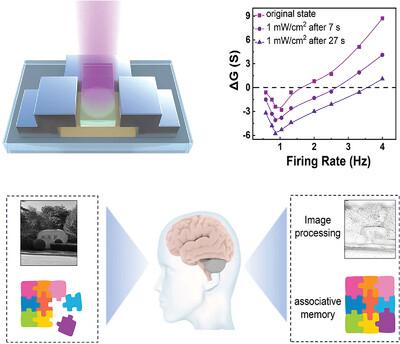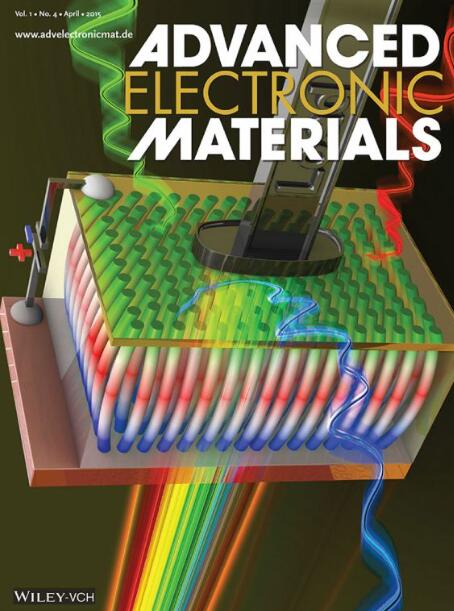An Electrolyte-Gated InGaZnO Phototransistor that Emulates Visual Experience-Dependent Plasticity
IF 5.3
2区 材料科学
Q2 MATERIALS SCIENCE, MULTIDISCIPLINARY
引用次数: 0
Abstract
Inspired by neurobiological learning rules, bionic devices that simulate the fundamental functions of synapses and neurons provide a highly effective approach to neuromorphic computing. Among various learning rules, the Bienenstock-Cooper-Munro (BCM) learning rule can explain the threshold sliding effect of synaptic weight modification in the visual cortex, which is difficult to explain with the classical Hebb's rule. Existing research mainly focuses on exploiting electrical stimulation to implement the BCM rule, while the optical implementation is still unexplored. In this paper, the light-history-dependent BCM learning rule is implemented with electrolyte-gated InGaZnO (IGZO) transistors. The channel conductance can be modulated through light illumination and electrical stimulation. By utilizing the light-history-dependent property of the IGZO electrolyte-gated transistor and following the triplet-spike-timing-dependent plasticity (STDP) rules, the BCM learning rule is successfully emulated in a single device. Moreover, the light-history-dependent property enables a variety of bionic vision functions including image edge detection and associative memory. This work provides a paradigm for the novel implementation of the BCM rule and paves the way for further development of machine vision systems.

一种电解质门控 InGaZnO 光电晶体管,可模拟视觉体验的可塑性
受神经生物学学习规则的启发,模拟突触和神经元基本功能的仿生设备为神经形态计算提供了一种高效的方法。在各种学习规则中,Bienenstock-Cooper-Munro(BCM)学习规则可以解释视觉皮层中突触权重修正的阈值滑动效应,而经典的Hebb规则很难解释这种效应。现有的研究主要集中在利用电刺激来实现 BCM 规则,而光学实现该规则的方法尚未被探索。本文利用电解质门控 InGaZnO(IGZO)晶体管实现了依赖光历史的 BCM 学习规则。沟道电导可通过光照和电刺激进行调制。通过利用 IGZO 电解质门控晶体管的光历史依赖特性,并遵循三重尖峰计时依赖可塑性(STDP)规则,在单个器件中成功模拟了 BCM 学习规则。此外,光历史依赖特性还能实现多种仿生视觉功能,包括图像边缘检测和联想记忆。这项工作为 BCM 规则的新颖实施提供了范例,并为机器视觉系统的进一步发展铺平了道路。
本文章由计算机程序翻译,如有差异,请以英文原文为准。
求助全文
约1分钟内获得全文
求助全文
来源期刊

Advanced Electronic Materials
NANOSCIENCE & NANOTECHNOLOGYMATERIALS SCIE-MATERIALS SCIENCE, MULTIDISCIPLINARY
CiteScore
11.00
自引率
3.20%
发文量
433
期刊介绍:
Advanced Electronic Materials is an interdisciplinary forum for peer-reviewed, high-quality, high-impact research in the fields of materials science, physics, and engineering of electronic and magnetic materials. It includes research on physics and physical properties of electronic and magnetic materials, spintronics, electronics, device physics and engineering, micro- and nano-electromechanical systems, and organic electronics, in addition to fundamental research.
 求助内容:
求助内容: 应助结果提醒方式:
应助结果提醒方式:


